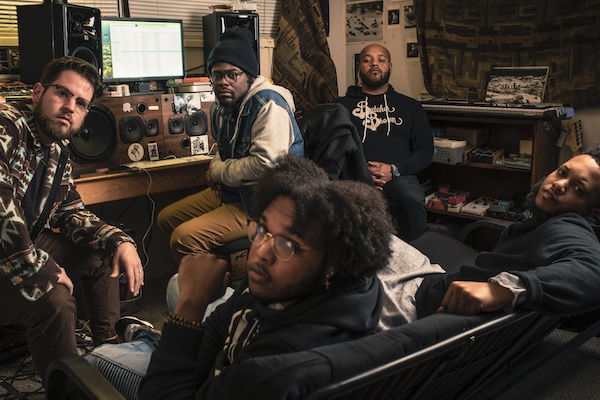Jazz Album Review: Butcher Brown’s “#KingButch” — Beautifully Blurring Retro and Progressive
By Scott McLennan
“Best band in the world”? Butcher Brown spends the next 40 minutes or so living up to its boast, as song after song heads off into a different direction without a stumble or misfire.
#KingButch, Butcher Brown

Butcher Brown — the band’s new album takes its high-flying eclecticism to new heights. Photo: Jacob Blickenstaff.
#KingButch sure could have been a mess, given all the influences Butcher Brown celebrates as well as the risky stylistic leaps the band makes across the album’s 13 tracks.
Instead, Butcher Brown emerges on its eighth recording as supremely confident, in command of a mix-and-match approach that beautifully blurs traditions retro and progressive. The result is a fresh, distinct sound that lives clearly in the moment.
That esthetic firmly places Butcher Brown in the jazz camp. Yet hip-hop, soul, funk and R&B equally shape the music Butcher Brown has been working on since its members came together in 2009. And they take this high-flying eclecticism to new heights on #KingButch.
“Fonkadelic” serves as a short P-Funk-style prelude album opener, but rather than blast off into a George Clinton-inspired production, Butcher Brown bounces into the wiry, hip-hop groove of the album’s title track, which features MC Marcus “Tennishu” Tenney rapping a chilled ode to both the group and its new work, culminating with the line “Best band in the world.”
Butcher Brown spends the next 40 minutes or so living up to the boast, as song after song heads off into a different direction without a stumble or misfire.
“Broad Rock” is a laid back head bobber featuring Tenney’s work on sax and trumpet against a thick groove detailed by Morgan Burrs’ sinewy guitar work. “Cabbage (DCF)” follows, and it is a funk-rock blowout that huzzahs the ensemble playing of DJ Harrison on keys, Corey Fonville on drums, Andrew Randazzo on bass — along with the efforts of Tenney and Burrs. The band pays homage to its pals Lettuce here, and in doing so proves that how Butcher Brown has grown to stand shoulder-to -shoulder with its peers and supporters.
The groove then switches over to a bossa nova beat, which is given a hip-hop treatment on the ethereal “Gum in My Mouth.” “For the City” is a more straightforward hip-hop track and features rapper Fly Anakin trading urgent verses with Tenney about their Richmond, VA, home base.
“Frontline” and its bass-driven intro are the record’s jazz anchors. They present the opportunity for Butcher Brown to most effectively melt genre boundaries. Good music is good music no matter which camp a player — or listener for that matter — is standing in.
The one other vocal track on the album is the short, frantic freestyle number “Hopscotch,” which serves as a creative break between the album’s two cover songs – Mtume’s 1978 soul jam “Love Rock” and Ronnie Laws’ 1975 jazz fusion standard “Tidal Wave.” On both of those numbers, Butcher Brown remains faithful to the original, but freshens up its arrangements via a warmer, live-feeling production.
The album ends with the sprawling “IDK,” one last expansive look at everything the band has to offer sonically. The spotlight moves across each band member, opening the floodgates for memorable licks and tones set to shape-shifting rhythms that guide the festive action as it rushes, slows, soars and lands.
#KingButch was originally due out on Juneteenth. Like much of everything else in the arts word, that plan was scuttled by the COVID-19 pandemic. Too bad we had to wait — this is vital music that can’t wait to be heard.
Scott McLennan covered music for the Worcester Telegram & Gazette from 1993 to 2008. He then contributed music reviews and features to the Boston Globe, Providence Journal, Portland Press Herald, and WGBH, as well as to the Arts Fuse. He also operated the NE Metal blog to provide in-depth coverage of the region’s heavy metal scene.
